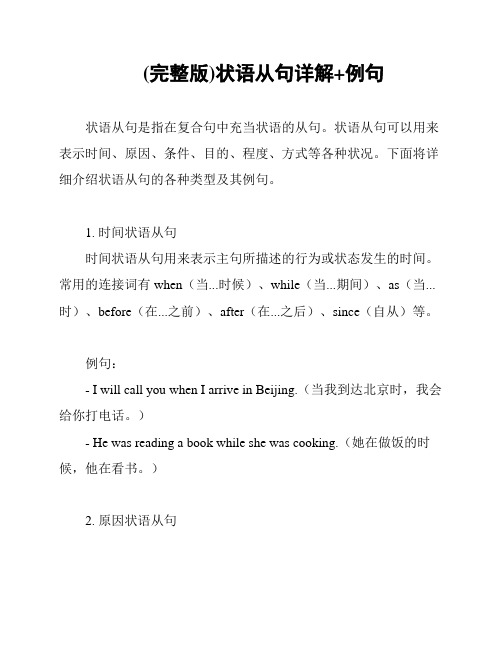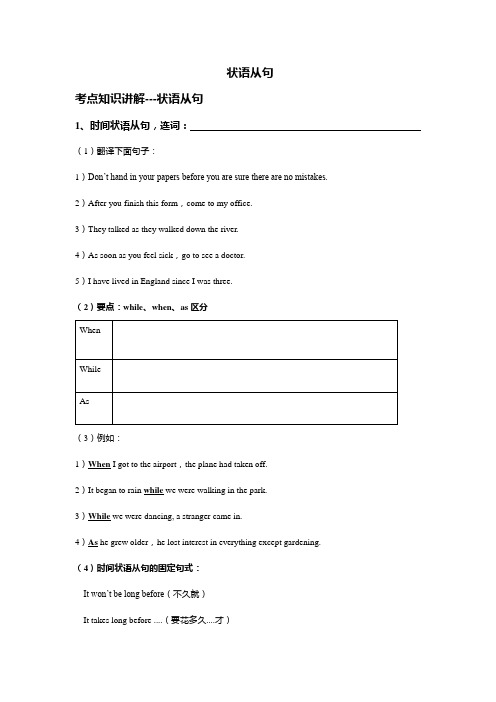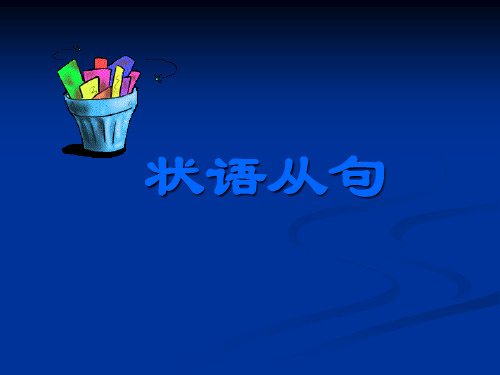(完整版)状语从句的讲解最全的状语从句讲解
(完整版)状语从句详解+例句

(完整版)状语从句详解+例句状语从句是指在复合句中充当状语的从句。
状语从句可以用来表示时间、原因、条件、目的、程度、方式等各种状况。
下面将详细介绍状语从句的各种类型及其例句。
1. 时间状语从句时间状语从句用来表示主句所描述的行为或状态发生的时间。
常用的连接词有when(当...时候)、while(当...期间)、as(当...时)、before(在...之前)、after(在...之后)、since(自从)等。
例句:- I will call you when I arrive in Beijing.(当我到达北京时,我会给你打电话。
)- He was reading a book while she was cooking.(她在做饭的时候,他在看书。
)2. 原因状语从句原因状语从句用来表示主句所描述的行为或状态的原因。
常用的连接词有because(因为)、since(因为)、as(由于)、for (因为)等。
例句:- I can't go to the party because I have to work.(我不能去参加派对,因为我得工作。
)- Since it is raining, we should stay at home.(由于下雨了,我们应该待在家里。
)3. 条件状语从句条件状语从句用来表示主句所描述的行为或状态的前提条件。
常用的连接词有if(如果)、unless(除非)、whether(无论)、provided(倘若)等。
例句:- If it rains tomorrow, we will stay indoors.(如果明天下雨,我们会呆在室内。
)- We can go shopping unless it is too late.(除非太晚,否则我们可以去购物。
)4. 目的状语从句目的状语从句用来表示主句所描述的行为或状态的目的。
常用的连接词有so that(以便)、in order that(为了)、lest(免得)等。
状语从句完整讲解

状语从句考点知识讲解---状语从句1、时间状语从句,连词:(1)翻译下面句子:1)Don’t hand in your papers before you are sure there are no mistakes. 2)After you finish this form,come to my office.3)They talked as they walked down the river.4)As soon as you feel sick,go to see a doctor.5)I have lived in England since I was three.(2)要点:while、when、as区分WhenWhileAs(3)例如:1)When I got to the airport,the plane had taken off.2)It began to rain while we were walking in the park.3)While we were dancing, a stranger came in.4)As he grew older,he lost interest in everything except gardening. (4)时间状语从句的固定句式:---It won’t be long before(不久就)---It takes long before ....(要花多久....才)---It didn’t take long before....(不久就)---It will be long before...(要花多久...才)★以上这四句话同学们可自己体会,此句型主要考在改错、语法填空中。
---Sb was doing sth when...=Sb was about to do when...(某人正要做...另一件事发生)---It is/has been +一段时间+since(did)...(自从某人做...已经有多久了)★这两句型也多考在改错和语法填空中,可多留意或自己再多造几个句子理解。
(完整版)状语从句知识点大全

(完整版)状语从句知识点大全状语从句是一个句子做另一个句子的状语,用于描述、限制、补充或解释主句的动作或状态。
在英语语法中,状语从句非常常见且广泛应用。
以下是状语从句的一些常见知识点:1. 时间状语从句(Time Adverbial Clauses):用来表示时间,常用的引导词有when, while, as, before, after, until, since等。
例如:I will call you when I arrive home.翻译:我到家时会打电话给你。
2. 地点状语从句(Place Adverbial Clauses):用来表示地点,常用的引导词有where, wherever等。
例如:She can't find her keys anywhere.翻译:她无论到哪儿都找不到她的钥匙。
3. 原因状语从句(Cause Adverbial Clauses):用来表示原因,常用的引导词有because, since, as, for等。
例如:I didn't go to the party because I was tired.翻译:因为我累了,所以我没有去参加聚会。
4. 结果状语从句(Result Adverbial Clauses):用来表示结果,常用的引导词有so, therefore, thus等。
例如:He studied hard, so he passed the exam.翻译:他努力研究,所以他通过了考试。
5. 条件状语从句(Condition Adverbial Clauses):用来表示条件,常用的引导词有if, unless, provided that等。
例如:If it rains tomorrow, we won't go to the park.翻译:如果明天下雨,我们不会去公园。
6. 目的状语从句(Purpose Adverbial Clauses):用来表示目的,常用的引导词有so that, in order that等。
状语从句知识点详解(初中英语专项复习)14

状语从句知识点详解(初中英语专项复习)状语从句的概念: 用一个句子作状语来修饰动词和形容词,以表明动作发生或状态存在的时间、地点、原因等,这个句子就叫做状语从句。
状语从句的分类:状语从句共分为九大类,包括:时间、地点、原因、条件、让步、目的、结果、方式、比较状语从句。
下面分别讲解:一、时间状语从句概念:用来表示时间的状语从句,由when, while, as, till, until,before, after, since等引导。
由于时间状语从句的引导词所表示的意思并非一致,不同引导词表达不同的时间,它们在句子中对应的时态、语态等也有所不同。
例如:when /while引导的时间状语从句when引导的从句的谓语动词通常是瞬间动词,也可以是延续性动词。
从句动作可与主语动作通常先后发生也可同时发生。
I was writing when my sister came back.( come是瞬间动词,只能用when引导,不能用while)He often wrote me when/while he studied in Shanghai International Studies University.( study 是延续性动词,while可代替when)While my mother was cooking , I was playing chess with dad. (cook是延续性的动词,cook和play同时发生)I like playing chess while my sister likes reading stories.我喜欢下棋,而我姐姐喜欢看小说。
(while表示对比)when和while的区别还有:while引导的时间状语从句多用于进行时态,而when引导的时间状语从句多用于一般时态。
While we were playing games, our headmaster called me .我们正在做游戏的时候,校长叫我了。
状语从句的用法讲解[整理版]
![状语从句的用法讲解[整理版]](https://img.taocdn.com/s3/m/1e680b72793e0912a21614791711cc7931b77806.png)
状语从句一、概述状语从句(adverbial clause)在句中作状语,可修饰主句中的动词、形容词和副词等。
状语从句由从属连词引导。
状语从句可放在句首或句末。
放在句首时,从句后面常用逗号;放在句末时,从句前面往往不用逗号。
When the plane arrived, some of the detectives were waiting inside the main building while others were waiting on the airfield.当飞机抵达时,一部分侦探等在主楼里面,而另一部分则等在停机坪上。
When I came home, my wife was cooking dinner. 我回家时,妻子在做晚饭。
Though he was poor, he was happy. 虽然他很穷却很快乐。
If you ask him, he will help you. 如果你向他请求,他会帮助你。
Since you ask, I will tell you. 你既然问,我就告诉你。
I can't tell you when you won't listen. 既然你不想听,我就不告诉你了。
He stopped trying, when he might have succeeded next time. 他不再试了,其实他可能下一次就成功。
二、引导状语从句的连词分类状语从句根据它们的含义分为时间、地点、原因、目的、结果、方式、让步、条1、引导时间状语从句从属常用连词例析常用来引导时间状语从句的从属连词有:when(当……的时候),whenever(每当),after(在……之后),before(在……之前),as(当…… ;一边……一边),as soon as/hardly…when/no sooner…than(一……就……),while(在……期间),till/until(直到),since(自从),once(一旦……就……)。
状语从句讲解经典

意思为既然或考虑到 (原因状语从句) It was foolish of you to take a taxi when you could easily walk there. How can they learn anything when they spend all their spare time watching television? Why do you want a new job when you have got such a good one? There is no point (in) owning a car when we have so good a public transport system. Why use metal when you can use plastic? How can he get the promotion when his boss dislikes him?
I will tell her about it when I see her. I was about to fall asleep when my sister came in. I will go home when he comes back.
I recognized the thief when/ as I passed him. When he finished his lecture, people stood up and applauded. I was walking on the street when I came across an old friend. We were about to set off when it began to rain. He had just finished the work when the doorbell rang. We were on the point of driving away when the policeman signed us to stop.
状语从句讲解及习题附答案

状语从句讲解及习题附答案(一)状语从句概述定义状语从句用作状语,是起副词作用的句子。
位置状语从句可以放在主句之前,也可以放在主句之后,时间、条件、原因和让步状语从句放在句首时需要用逗号和主句隔开。
分类根据其作用可以分为时间、地点、原因、条件、目的、让步、方式和比较等状语从句。
作用它可以修饰谓语、非谓语动词、定语、状语和整个句子。
(二)状语从句详解1. 时间状语从句引导词用法示例when 意为“当…的时候”。
When引导从句的谓语动词可以是延续性动词,也可以是瞬间动词。
并且when有时表示“就在那时”A liar is not believed when he speaks the truth.说谎者讲真话时也没有人相信。
When he arrives, I’ll call you. When you laugh and smile, your body relaxes.while 意为“在…的时候,在…的同时”。
While引导从句的谓语动词必须是延续性的,发生时间较长,并强调主句和从句的动作同时发生(或者相对应)。
While有时还可以表示对比。
While I was standing at the window, I saw several boys running along the street.While John was watching TV, his wife was cooking.as 意为“一边…一边…”。
As引导的动作是延续性的,发生时间较短,一般用于主句和从句动作同时发生;as也可以强调一前一后。
The writer was angry as he was travelling on a train to London because someone had invaded his “space”.He smiled as he stood up.after 意为“在…之后”。
完整版)状语从句(9种全)

完整版)状语从句(9种全)状语从句在复合句中起到修饰主句的作用,分为时间、地点、原因、目的、结果、条件、方式、比较、让步等种类。
1.时间状语从句时间状语从句的连接词包括when。
as。
while。
after。
before。
since。
ever since。
as soon as。
once。
till。
until。
whenever。
no sooner…than。
hardly/scarcely。
when。
the moment/minute/instant/second。
every time。
each time。
any time。
the first time。
next time。
last time。
all the time。
by the time。
directly。
immediately。
instantly等。
例如,“一···就···”的句型可以用as soon as或once引导,其中as soon as侧重时间或动作先后衔接紧,而once侧重条件,表示“一旦。
”;on doing sth/on one's + n.作时间状语,例如On arriving at the n。
the thief was arrested.意为“一到达车站,这个小偷就被逮捕了。
”2.地点状语从句地点状语从句的连接词包括where。
wherever。
anywhere。
everywhere等。
例如,I'll go wherever you go.意为“你去哪儿,我就跟你去哪儿。
”3.原因状语从句原因状语从句的连接词包括because。
since。
as。
now that。
seeing that。
considering that等。
例如,Since it's raining。
we'll stay indoors.意为“因为下雨,我们将待在室内。
- 1、下载文档前请自行甄别文档内容的完整性,平台不提供额外的编辑、内容补充、找答案等附加服务。
- 2、"仅部分预览"的文档,不可在线预览部分如存在完整性等问题,可反馈申请退款(可完整预览的文档不适用该条件!)。
- 3、如文档侵犯您的权益,请联系客服反馈,我们会尽快为您处理(人工客服工作时间:9:00-18:30)。
状语从句的讲解就是用一句话作状语分为:时间,地点,方式,原因,结果,条件,让步,目的,比较一、时间状语从句第一次见到你一见到你我就喜欢上了你直到见到你五岁时见到你When, as, while, before, after, since, till/until, as soon as no sooner…than…scarcely…when…hardly…when… the minute the second the instant the moment by the time 截止 immediately instantly directlyeach time every time next time the first time on doing sthwhenwhile 当…时as1。
when 1)当…时/ 延续性动词短暂性动词都可用2)这时/3)届时、到时I was watching TV when my cellphone suddenly rang这时When I was five years old I could speak five languagesThe wet weather will continue tommorow when a cold front is expected to arrive届时到时注意:时间状语从句中动作发生有前后时先发生的用过去完成时When my mother came back I had already gone to bed.2。
while 1)从句动词延续性2)同时发生3)对比的意味“然而”4)趁着He taught himself while he worked in a bank 延续性动词当他在银行上班时While we were working they were having a rest.对比While they were having a discussion , they got very confused。
同时I want the girls to experience that while they are young趁着她们还年轻我想让姑娘们体验一下对比:I prefer black tea, while he likes coffee3。
As 1)当…时2)一边..。
一边3)随着As the children walked along the street, they sang happily.当孩子们He sang as he danced一边一边You will grow wiser as you grow older随着4.before 1)在…前2)前加一段时间直到…才…3)还没来得及4)要过…时间才I’ll be back before you leaveIt may be many years before we meet again 可能要过很多年我们才能见面It will be three weeks before he finished his workIt won’t be long before he finished his work。
用不了多久5.afterAfter my friend got married, she went to live in America6。
since 自从主句一般为现在完成时We’ve never met since we graduated from the collegeGreat changes have taken place since you left7。
till/untill肯定句中可互换直到…为止否定句中只用not…until…直到…才Not until 放句首句子部分倒装(倒装主句)Donald will remain in college until/till he finished his PhD courseDonald won’t leave college until he finished his PhD courseI won’t go with you until I finished my homeworkNot until my mother came back did I go to bed8.as soon asI gave the alarm as soon as I saw the smoke.一看见冒烟就发出警报He will be set free as soon as the fine is paid9。
the minuteThe secondThe instant瞬间片刻立即的立刻的素食的The momentThe minute we got home, the telephone rang10. no sooner…than…Scarcely…when…Hardly…when…I had no sooner got home than it began to rain.The fans had hardly seen the movie star when they criedThe fans had scarcely seen the movie star when they cried注意:他们提前句子部分倒装No sooner had I got home than it began to rain.Hardly had I got home when it began to rainScarcely had the fans seen the movie star when they cried11.名词引导的时间状语从句The first time I saw you I mistook you for a film starNext time I see you I will tell you the truthEvery time/each time I see this picture I think of my hometown.12。
On+ doing 一…就…On arriving home, he discovered they had gone 一到家发现他们已经走了13.immediately instantly directlyImmediately she had gone, I remembered her name.她刚走开我就想起了她的名字14.by the time 1)从句是一般现在时主句用将来完成时2)从句是一般过去时主句用过去完成时By the time you receive this letter, I will have left this cityI shall have finished it by the time you come back 你回来以前我就做完了注意:as soon as after before 常与过去完成时连用After I had finished my homework I went to sleepBefore I went to sleep I had finished my homeworkAs soon as I had finished my homework I went ot sleep.但是如果不强调时间的先后都可以用一般过去时After I finished my homework I went to sleep/二、地点状语从句一、Where在…地方 wherever无论哪里 anywhere任何地方 everywhere到处1.whereYou should put the book where you found itWe must camp where we can find waterYou had better make a mark where you have any questions.2。
whereverwherever there is smoke, there is fireplease put the cup wherever that is convinient3.anywhereYou can put it anywhere you likeI can’t stay anywhere there are a lot of people4。
everywhereEverywhere I go, I find the same thing.去到的每一处都看到同样的情况I have searched everywhere there is a clue二、与定语从句的区别1。
定语从句中where是关系副词在从句中充当状语前面有表示地点的名词状语从句中where是从属连词引导的从句修饰主句的谓语动词整个句子做状语前面无先行词Bamboo grows best in places where it is warm and where it rains often。
Bamboo grows best where it is warm and where it rains often。
Go back where you came fromGo back to the place where you came2.where 引导的状从可放在句首与句末都可而where 引导的定语从句只放在句末三、练习1.he advised me to live_______ the air is fresherA。
in where B.in which C. the place where D. where2。
in peace too, the Red Cross is expected to send help _______ there is human sufferingA。
whoever B。
however C。
whatever D.wherever3。
if you are travelling____the customs are really foreign to you own . please do as the Romans doA. in whichB. whatC. when D。
where三、原因状语从句Because since for as now that in that because of 既然鉴于 in as much as既然鉴于in so far asFor the reason that 由于…原因 due to the fact that 由于…事实 owing to the fact that1。
